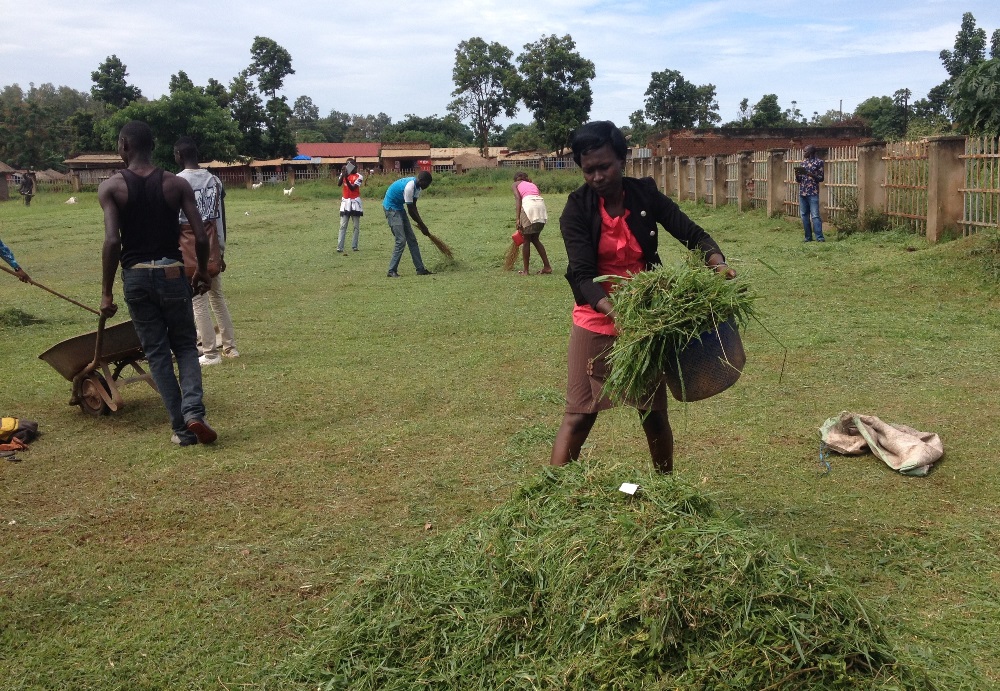Members of NUMEC cleaning the palace of their King, Rwot David Onen-Acana II
Uganda has enjoyed relative peace in the last ten years without rebel activities. However, it is still ranked number 117 out of 180 countries making it worse off than war-ravaged Central African Republic (CAR), which is placed at number 112 by RSF.
“Journalists are often the victims of intimidation, physical violence and arrests… Investigative reporting is very risky in Africa. Journalists are encountering growing difficulties when covering subjects with national security ramifications”
GULU-UGANDA: The media fraternity, world over, celebrated ‘World Press Freedom Day’ last Thursday, May 3, 2018 under the theme: ‘Keeping Power in Check: Media, Justice and the Rule of Law’. This year, the main celebration was held in Ghana’s capital City, Accra, in West Africa.
Every year, various organizations release press index reports indicating how the media faired in its work and the kind of challenges they faced the previous year.
‘Reporters Without Borders (RSF)’ released the 2017 index just before the commemoration in Accra, Ghana; which country featured in number 23 out of 180 countries surveyed by RSF.
The report analysis indicates that in Africa, only media practitioners in Ghana enjoy relative freedom in the course of their work compared to other countries in the continent.
Ghana is followed by South Africa in the 28th position while Burkina Faso is in the third position at 41st. Sweden is in the first position where the media practitioners have the best working environment while North Korea trails as the worst working environment for journalists in the world.
Uganda has enjoyed relative peace in the last ten years without rebel activities. However, it is still ranked number 117 out of 180 countries making it worse off than in war-ravaged Central African Republic (CAR), which is placed at number 112 by RSF.
The report puts Uganda below its original East African Community (EAC) member- countries, Tanzania and Kenya; which are at number 93 and 96 respectively.
The latest country to join the block, battle hardened South Sudan is ranked at number 144 making it better to be a journalist in than Rwanda, at number 156 or Burundi, at number 159.
“Journalists are often the victims of intimidation, physical violence and arrests… Investigative reporting is very risky in Africa. Journalists are encountering growing difficulties when covering subjects with national security ramifications”, reads part of RSF report.
In Uganda, Human Rights Network for Journalists (HRNJ-U) also released its 9th report since 2009 titled: ‘Critical Journalism Under Attack’ where it documented cases perpetrated against journalists and media houses in 2017.
The year 2016 and 2017 have been littered with various politically charged national agendas touching on proposals to amend land laws and remove the presidential age limit from 75 years’ cap paving way for Uganda’s dictator who has ruled this country with an iron fist, to rule for life.
The analysis also raises a red flag on the increasing unfettered powers of the Uganda Communications Commission (UCC) which is on an unprecedented course of restricting rather than regulating freedom of expression and media rights as exemplified in its various orders in 2017.
HRNJ-U documented 113 cases of violations and abuses against media fraternity in 2017 with Police as the worst violator of free press with 83 cases, representing 73% (percent). The force made 45 arrests and detentions, 21 cases of assault and 7 cases of malicious damage to journalists’ equipments. Abuse on female journalists stood at 13 cases representing 12% (percent).
Although Article 41 of the 1995 Uganda Constitution guarantees ‘right to access to information in the possession of the State and ‘to freedom of expression’, the country still has other laws which restrict or curtail those rights.
Laws like Computer misuse Act 2011, Uganda Communications Commission Act as Amended in 2016, Penal Code Act, Anti- Terrorism Act 2002 plus numerous others are not friendly to freedom of press and expression.
In northern Uganda, the media fraternity under their umbrella organization, the Northern Uganda Media Club (NUMEC), held pre-event day activity by cleaning the palace of Acholi Kingdom and had breakfast with Acholi Chief, Rwot David Onen-Acana.
Rwot Acana complained that issues related to northern Uganda is not getting desired coverage as is the case with central Uganda.
They also held talk-shows in various radio stations in Gulu sensitizing the community on the critical role of the media in community transformation and development.
During a public dialogue which was held in the Gulu district council hall on Thursday, May 3, 2018, the Secretary General of NUMEC, Mr. Arthur Okot advised those who view the media as a threat ‘to know that professional journalism benefits all; it empowers the public through access to timely information; and it holds those with power accountable’.
“On this World Press Freedom Day, I want to say that the media, the public and those who hold power are supposed to have mutual respect for each other in order to serve the public interest. Members of NUMEC should practice professional journalism to check power and promote justice and the rule of law”, says Mr. Okot.








